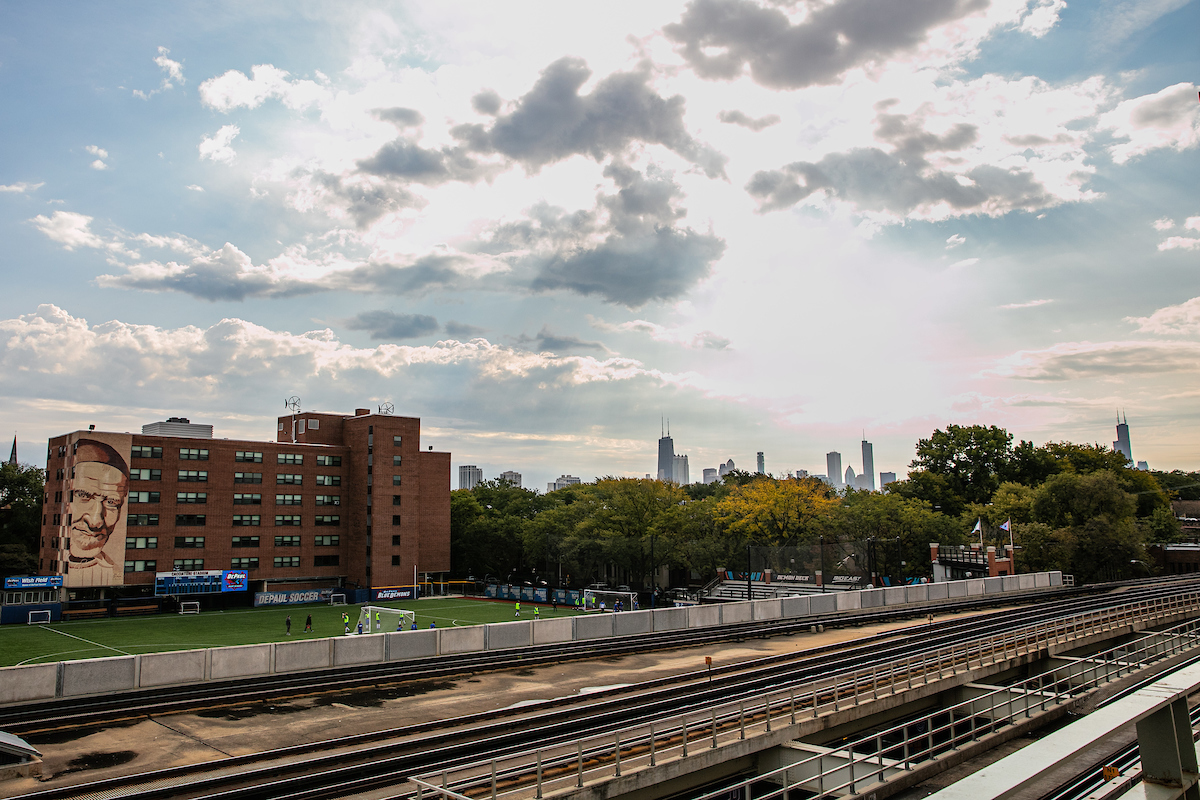 (DePaul University/Randall Spriggs)
(DePaul University/Randall Spriggs)
Known for generations as “the city of broad shoulders" and “meatpacker to the world," Chicago stands today at the brink of a new commercial identity: where university research helps turn the ideas of today into the solutions of tomorrow.
This theme drove DePaul's third annual Innovation Day on Jan. 28, as university professors discussed how inspiration and investigation had combined to yield practical results.
Chicago's corporate base is increasingly making room for startups, says keynote speaker Abin Kuriakose, the executive vice president of World Business Chicago.
“Chicago is no longer seen as 'flyover country' but rather as a sort of emerging market," where partnerships between founders, nonprofits, corporations and academia help encourage new ventures, Kuriakose says.
From health care to food to transportation, he adds, “Chicago entrepreneurs and their startups are reinventing legacy industries, and they're doing it right here in Chicago, not Silicon Valley."
Innovation Day provided the opportunity for DePaul professors to discuss through a series of panel discussions how they, too, represent this dynamic of foresight and opportunity.
The spark of inspiration has taken many different forms, the panelists explained. For Computing and Digital Media Associate Professor Lucia Dettori, it was seeing black and brown students consistently not enrolling in her computer science classes. For Environmental Science and Studies Associate Professor James Montgomery, it was recognizing how economic barriers deter students of limited means — especially racial minorities and first-generation students — from pursuing STEM majors.
And Management Information Systems Associate Professor Yele Adelakun was inspired by the ideas of students and faculty, concepts that, with the right financial backing, could stir needed change.
These DePaul faculty members and many others explained the genesis of their ideas and what they did next, whether through grants, partnerships or new initiatives. Collectively, their presentations were testimony to what Associate Provost for Research Daniela Stan Raicu calls DePaul's “vibrant and innovative community."
Once she recognized the problem, Dettori teamed with a Chicago Public Schools high school teacher to identify potential solutions. Through a joint venture called CAFÉCS, they enlisted support from others in persuading the school district to adopt a new graduation requirement: Students must take at least one introductory computer science class.
Ten years later, the number of CPS students taking a computer science class has grown sixfold.
“We've achieved some of our goals," Dettori says, “but systemic change really takes time, and we're talking about a systemic issue in computer science."
The systemic issue that Montgomery saw was a “glass obstacle course": the summer field research required of STEM undergraduates that can cost several thousand dollars.
In response, Montgomery and colleague Douglas Bruce launched the Rising STEM Scholars program within the College of Science and Health for first-year STEM majors.
The capstone of the program is a paid summer research opportunity that teams students with faculty mentors. In the first two years, 87% of Rising Scholars identified as a racial minority, and all but one of last year's scholars identified as women, Montgomery reports.
In addition, he and colleagues wrote a successful grant proposal that drew $1 million from the National Science Foundation to fund the Engage and Persist in STEM Project, or EPISTEM, for five years. The EPISTEM program also includes a research requirement, giving students hands-on experience to feed their commitment to their studies.
“Only when academia removes these obstacles will we see greater success in attracting and retaining minority students in STEM," Montgomery says.
Adelakun's response to seeing the creativity within DePaul was to found a venue, the Innovation Development Lab, where these ideas could intersect with business models for the marketplace.
Adelakun says that universities provide the skill, knowledge and research that companies need to innovate constantly. CEOs recognize this important quality and are looking to partner with schools that encourage such entrepreneurial thinking, he adds.
“You cannot innovate at the speed necessary unless you are connected with the classroom," Adelakun says.
In his keynote, Kuriakose said that DePaul's urban character, Vincentian mission and well-known brand have positioned the university to capitalize on Chicago's growing interest in startups.
“DePaul does an amazing job of engaging with a cross-section of the Chicago civic ecosystem," he says. “It has the ingredients to prepare students to be real rock stars in the workplace."
Information on the Innovation Day 2022 panelists is available on the Innovation Day website.
Scott Butterworth is an editor of Newsline.